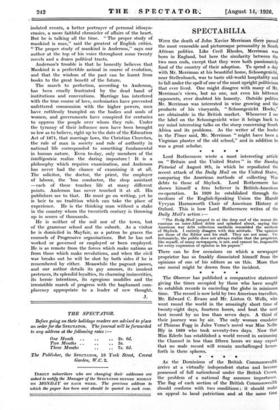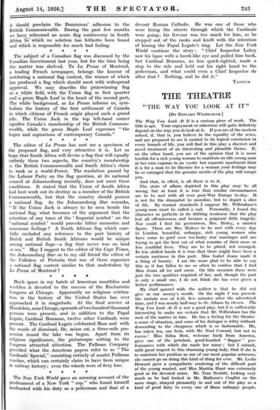• SPEC TABILIA
WITH the death of John Xavier Merriman them passed the most venerable and picturesque personality in South African politics. Like Cecil Rhodes, Merriman was born in England, but here the similarity between the two men ends, except that they were both passionately fond of the country of their adoption. To spend a day With Mr. Merriman at his beautiful home, Schoongezicht, near Stellenbosch, was to taste old-world hospitality and to fall under the spell of one of the most upright politicians that ever lived. One might disagree with many of Mr. Merriman's views, but no one, not even his bitterest opponents, ever doubted his honesty. Outside politics Mr. Merriman was interested in wine growing and the products of his vineyards, " Schoongezicht Hocks," are obtainable in the British market. Whenever I see the label on the Schoongezicht wine it brings, back to my mind interesting talks on the stoep concerning South Africa and its problems. As the writer of the leader in the Times said, Mr. Merriman " might have been a Virginian planter of the old school," and in addition he was a great scholar.
* * * *
Lord Rothermere wrote a most interesting article on " Britain and the United States " in the Sunday Pictorial of August 8th, in which he repudiated the recent attack of the Daily Mail on the United States, comparing the American methods of collecting War debts to those of Shylock. Lord Rothermere has shown himself a firm believer in British-American co-operation. In 1920 he established through the medium of the English-Speaking Union the Harold Vyvyan Harmsworth Chair of American History at Oxford. This is how Lord Rothermere writes of the Daily Mail's action :— " The Daily Mail jumped in at the deep end of the recent dis- cussions on inter-Allied debts and splashed about, saying that American war debt collection methods resembled the methods of Shylock. I entirely disagree with this attitude. The opinions are those of the Editor and his staff. They are not mine. Un- fortunately, the public does not always realize that the proprietor, like myself, of many newspapers, is not, and cannot be, responsible for every expression of opinion in his papers."
There can be few occasions on which a newspaper proprietor has so frankly dissociated himself from the opinions of one of his editors as on this. More than one moral might be drawn from the incident.
* * * * The Observer has published a comparative statement giving the times occupied by those who have sought to establish records in encircling the globe in minimum time. The record is now held by two American travellers, Mr. Edward C. Evans and Mr. Linton 0. Wells, who went round the world in the amazingly short time of twenty-eight days, fourteen hours, and beat the next best record by no less than seven days. A third of their journey was by air. The only woman emulator of Phineas Fogg in Jules Verne's novel was Miss Nellie Bly in 1889 who took seventy-two days. Now that Miss Ederle has established a world record in Swimming the Channel in less than fifteen hours we may expect that no male_ will remain unchallenged hence, fOrth in theie spheres.
* • • * * • * As the Dominions of the Ilritish Commonwealth arrive at a virtually independent status and become posiessed of full nationhood under the British Crowd, the problem of a national flag assumes importance. The flag of each section. of the British Commonwealth should conform with two conditions ; it should make an appeal to local patriotism and at the same time it should proclaim the Dominions' adhesion to the British Commonivealth: During the past few months we have witnessed an acute flag controversy in South Africa 1:4:7" which' no solution has hitherto been found and which is responsible for much bad feeling.
* * * * The subject of a Canadian flag was discussed by the Canadian Government last year, but for the time being the matter was shelved. To La Presse of Montreal, a leading French newspaper, belongs the honour of instituting a national flag contest, the winner of which has produced a flag which should meet with widespread approval. We may describe the prizewinning flag as a :white field, with the Union flag in first quarter and a green Maple Leaf in the heart of the second part. The white background, as La Presse informs us, sym- bolizes the history of the first settlement of Canada in which citizens of French origin played such a grand role. The Union Jack in the top left-hand corner signifies Canada's membership of the British Common- wealth, while the green Maple Leaf expresses " the hopes and aspirations of contemporary Canada."
* * * * The editor of La Presse has sent me a specimen of the proposed flag, and very attractive it is. Let us hope that South Africa will devise a flag that will equally embody these two aspects, the country's membership in the British Commonwealth and South Africa's claim to rank as a world-Power. The resolution passed by the Labour Party on the flag question, at its national council at Johannesburg recently, does not meet these conditions. It stated that the Union of South Africa had best work out its destiny as a member of the British Commonwealth, but that the country should possess a national flag. As the Johannesburg Star remarks, " If the Union Jack is always to be seen beside the national flag, what becomes of the argument that the retention of any trace of the Imperial symbol ' on the national symbol ' would provoke bitter memories and rancorous feelings ? A South African flag which care- fully excluded any reference to the past history of Dutch and British. South Africans would be unique among national flags—a flag that never was on land or sea." May I suggest to the editor of the Cape Times, the Johannesburg Star or to my old friend the editor of the Volkstem of Pretoria that one of them organizes a national flag contest similar to that undertaken by La Presse of Montreal ?
* * * • * Much space in my batch of American monthlies and weeklies is devoted to the success of the Eucharistic Congress at Chicago. Apparently no religious celebra- tion in the history of the United States has ever approached it in magnitude. At the final service at Mundelein, near Chicago, upwards of two hundred thousand persons were present, and in addition to the Papal Legate, Cardinal Bonzano, twelve other Cardinals were present. The Cardinal Legate celebrated Mass and with the words of dismissal, Ite, missa est, a three-mile pro- cession round the lake was begun. Apart from its religious significance,_ the picturesque setting to the Congress attracted attention. The Pullman Company provided what the . American papers refer to as " The Cardinals' Special," consisting entirely of scarlet Pullman coaches, which van certainly claim to have been unique In railway history ; even the wheels were of fiery hue, * * * * The New York World gave an amusing account of the predicament of a New. York " cop." who found himself confronted with his duty as a policeman and that of a devout Roman Catholic. He was one of those who were lining the streets through which the Cardinals were going; his fervour was too much for him, so he stepped out of the ranks and knelt with the intention of kissing the Papal Legate's ring. Let the New York World continue the story : " Chief Inspector Lahey saw his lapse with a hawk-like eye and pulled him back, but Cardinal Bonzano, no less quick-sighted, made a step to the side and held out his right hand to the policeman, and what could even a Chief Inspector do after that ? Nothing, and he did it."
TANTUM



































 Previous page
Previous page